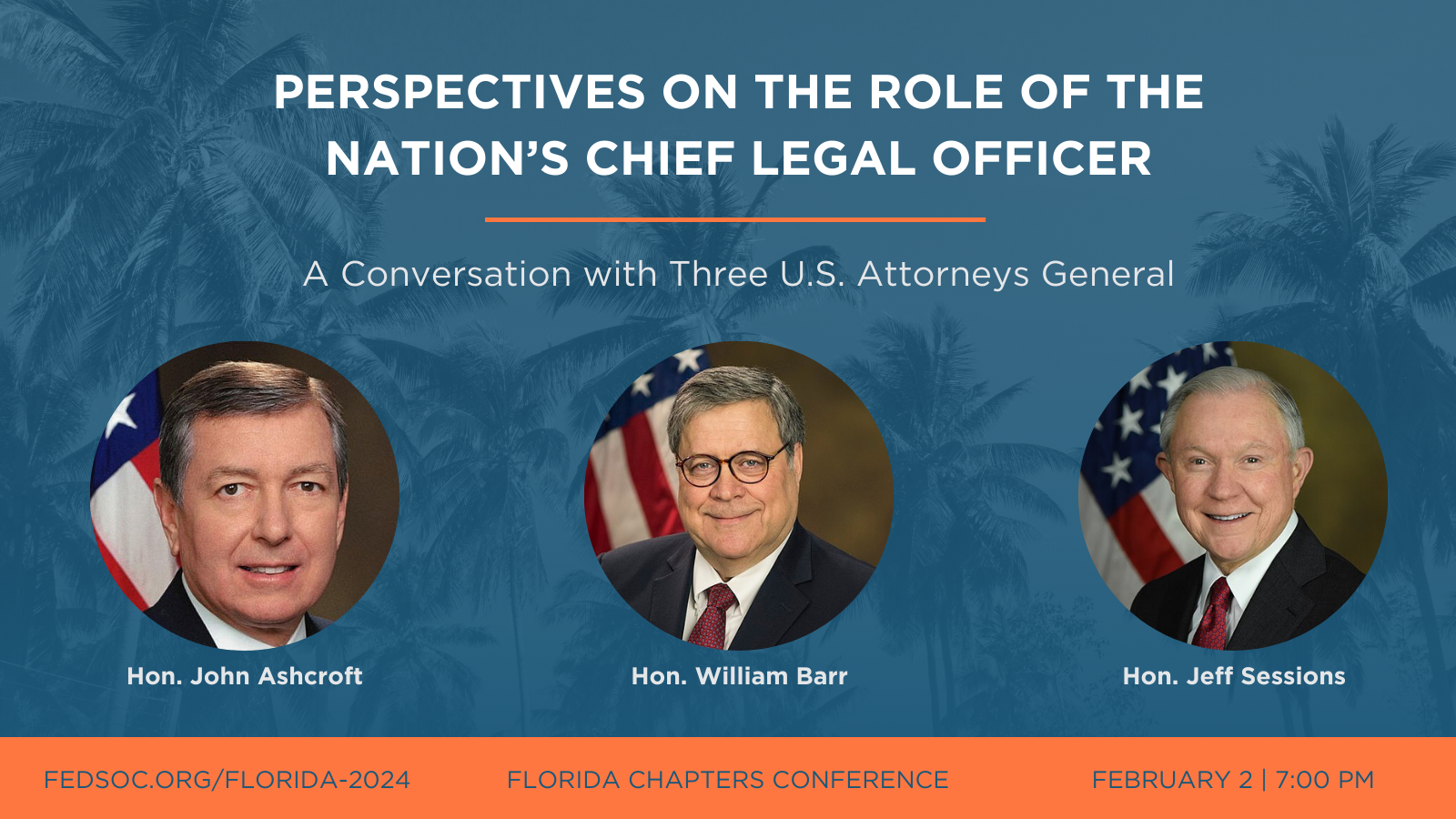6000 W Osceola Pkwy
Kissimmee, FL 34746

Join us on February 2-3, 2024 for the 10th Annual Florida Chapters Conference!
Banquet Speakers

Dietary restrictions or allergies? Please notify [email protected]
We have been approved for 10.5 hours of General CLE in Florida.
Certification Credits
State and Federal Government and Administrative Practice - 10.5
Civil Trial - 10.5
Florida CJE credit expected.
Gaylord Palms Resort & Convention Center
Reservations can be made HERE.
The deadline to reserve a room is Wednesday, January 10th, 2024. Rooms are available on a first come, first serve basis and will likely sell out before the deadline.
Limited rooms remaining.
If you are intersted in sponsoring the Federalist Society's activity in Florida, please reach out to Abbie Kepto at [email protected].
Please direct all seating requests for the banquet to Abbie Kepto at [email protected].
The deadline to receive a refund is 5:00 p.m. on Monday, January 29, 2024. No refunds will be given after the deadline has passed.
We are pleased to offer a group golf outing on Friday morning prior to the start of the conference. We have partnered with Celebration Golf Club, located 5 minutes from the Gaylord. Click HERE for more information and to sign up.
This event is closed to the press.
Back to top2024 Florida Chapters Conference
2024 Florida Chapters Conference
2024 Florida Chapters Conference
Justice Antonin Scalia succeeded in making textualism the predominant method of legal interpretation. But now that an increasing number of jurists are committed to that method, the question of how to do it well has acquired an even greater urgency. However, there are fundamental disagreements. According to Professor Will Baude, textualists risk arriving at “incomplete or misleading answers to important questions about the law” unless they learn to “supplement” plain text with “unwritten law, law that governs both interpretation and background principles against which interpretation takes place.” Is this “unwritten” law simply the canons of construction as articulated by the Supreme Court, pre-Erie General Law, the Natural Law, the Anglo-American legal tradition, the common law of the States, or something else? The answer certainly has important implications for judges, and it might vary depending on whether a litigant is in a federal or state forum, or whether the text to be interpreted is a statute, constitution, or a private-law matter like a contract. For textualists, determining if, when, and how these unwritten sources of law should be consulted are among the most pressing issues of the day. Panelists will consider these questions from their various perspectives from academia and from the bench.
Featuring:
2024 Florida Chapters Conference
The citizen-initiative process allows the People of Florida to propose amendments to the state constitution, subject to Supreme Court review. But what is the appropriate scope of judicial review of such ballot initiatives? Does the single-subject rule enable outcome-driven judicial decision-making? This panel will discuss these questions and others in the context of the Adult Personal Use of Marijuana and the Amendment to Limit Government Interference with Abortion initiatives.
Featuring:
2024 Florida Chapters Conference
2024 Florida Chapters Conference
Perspectives on the Role of the Nation’s Chief Legal Officer
A Conversation with Three U.S. Attorneys General
Featuring:
2024 Florida Chapters Conference
2024 Florida Chapters Conference
The state and federal bench has transformed in recent years, with more textualist/originalist judges appointed or elected. These changes are influencing how advocates should prepare to make winning arguments. A panel of jurists and leading litigators will offer their best advice to young advocates in making successful oral arguments and incorporating originalism and textualism into their briefs. They will offer their perspectives on how litigation tactics might change, if at all, at the appellate or trial court levels. They will also discuss why litigators play such a key role in encouraging textualist and originalist decisions.
Featuring:
2024 Florida Chapters Conference
The panel will discuss how these decisions are transforming the admissions process in higher education and the impact on the legal profession. Included in the discussion will be the response from academia, the permissible limits of the use of race in admissions after these decisions, and what impact this is expected to have on corporate America and the legal profession.
Featuring:
Lawmakers and courts have been reforming Florida’s tort and insurance laws for decades. From expansion of insurance bad faith and contraction of comparative fault in the 1990’s, to restrictions on medical malpractice suits in the 2000’s, to changes in tort and insurance litigation in the 2020’s, the legal landscape shifted dramatically. This panel will examine the latest reforms in the context of recent history, and it will debate where Florida policy should go from here.
Featuring:
2024 Florida Chapters Conference
Zionism: An Indigenous People’s Fight for its Ancient Homeland
Judge Altman led us on a journey from 1208 BC (when the Merneptah Stele, the first extra-biblical mention of the People of Israel, was composed) to Israel's current war with Hamas. Along the way, Judge Altman showed that Jews are indigenous to the land of Israel, that Jews have lived in (and often ruled) the land of Israel for thousands of years, and that the State of Israel is a legitimate sovereign over the lands it now governs. Judge Altman also addressed--and refuted--claims that Israel is an apartheid state, that Gaza was in any way occupied by Israel on October 7, and that Jews have obstructed the establishment of a Palestinian state. Finally, Judge Altman explained that Israel's military response to the horrific terror attacks of October 7 was (and remains) proportional under international law.
Featuring:
2024 Florida Chapters Conference